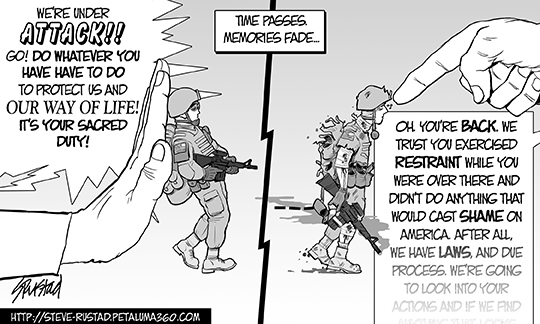Despite all the news, noise and arm-waving, America is (once again) doing a piss-poor job caring for those who volunteered to put themselves in harm’s way so that the home folks wouldn’t have to get their hair mussed. Though every time I turn around someone is starting some new “vets program,” few of these efforts are based on any actual experience or contact with real-world vets and their frustrating problems. Vets need jobs, yet the impact of war on service men’s and women’s minds and bodies makes it difficult for them to hold the typical mind-numbing entry-level job. Vets returning to school find it difficult relating to the entitled over-grown babies sitting in the chairs beside them. Vets need patient, determined, selfless counselling to help them understand and cope with their psychological damage. Despite some sincere efforts, the medical community is frantically playing catch-up ball to understand both the short-term and long-term consequences of traumatic brain injury (TBI) a consequence to anyone who was within ear-shot of an IED, artillery explosion or grenade blast. It’s a given that soldiers and Marines return to civilian life with back, knee and ear damage. Two million men and women have served in Iraq and Afghanistan. Unlike so many of their chronological peers, these veterans have been schooled in teamwork, service, duty and sacrifice. Next time you meet a veteran, go ahead, smile, and thank him or her for his service, but if you haven’t done something concrete to provide him or her with job or insure that he or she receives adequate care for the consequences of their sacrifice, you haven’t really done anything.
(Visited 4 times, 1 visits today)

